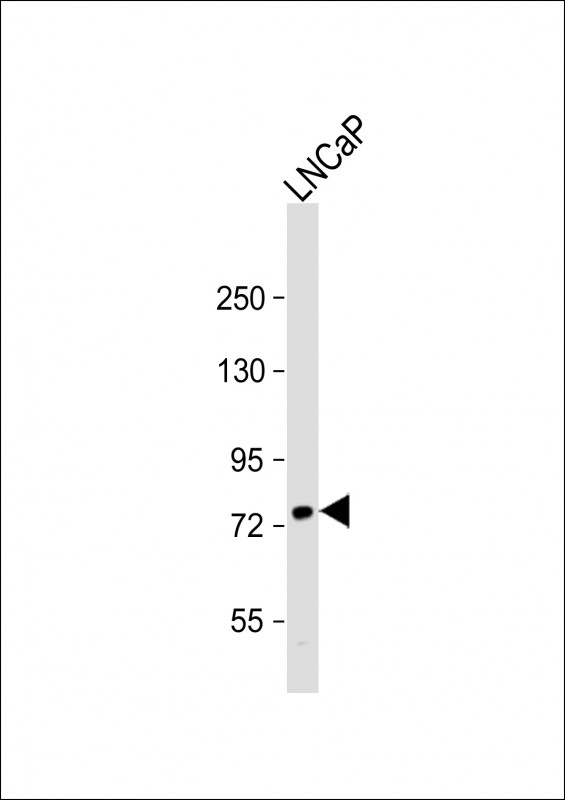PFKL Antibody (Center K433)
Purified Rabbit Polyclonal Antibody (Pab)
- 产品详情
- 文献引用 : 1
- 实验流程
- 背景知识
Application
| WB, E |
|---|---|
| Primary Accession | P17858 |
| Reactivity | Human |
| Host | Rabbit |
| Clonality | Polyclonal |
| Isotype | Rabbit IgG |
| Calculated MW | 85018 Da |
| Antigen Region | 371-399 aa |
| Gene ID | 5211 |
|---|---|
| Other Names | ATP-dependent 6-phosphofructokinase, liver type {ECO:0000255|HAMAP-Rule:MF_03184}, ATP-PFK {ECO:0000255|HAMAP-Rule:MF_03184}, PFK-L, 27111 {ECO:0000255|HAMAP-Rule:MF_03184}, 6-phosphofructokinase type B, Phosphofructo-1-kinase isozyme B, PFK-B, Phosphohexokinase {ECO:0000255|HAMAP-Rule:MF_03184}, PFKL |
| Target/Specificity | This PFKL antibody is generated from rabbits immunized with a KLH conjugated synthetic peptide between 371-399 amino acids from the Central region of human PFKL. |
| Dilution | WB~~1:1000 E~~Use at an assay dependent concentration. |
| Format | Purified polyclonal antibody supplied in PBS with 0.09% (W/V) sodium azide. This antibody is prepared by Saturated Ammonium Sulfate (SAS) precipitation followed by dialysis against PBS. |
| Storage | Maintain refrigerated at 2-8°C for up to 2 weeks. For long term storage store at -20°C in small aliquots to prevent freeze-thaw cycles. |
| Precautions | PFKL Antibody (Center K433) is for research use only and not for use in diagnostic or therapeutic procedures. |
| Name | PFKL (HGNC:8876) |
|---|---|
| Function | Catalyzes the phosphorylation of D-fructose 6-phosphate to fructose 1,6-bisphosphate by ATP, the first committing step of glycolysis (PubMed:22923583). Negatively regulates the phagocyte oxidative burst in response to bacterial infection by controlling cellular NADPH biosynthesis and NADPH oxidase-derived reactive oxygen species. Upon macrophage activation, drives the metabolic switch toward glycolysis, thus preventing glucose turnover that produces NADPH via pentose phosphate pathway (By similarity). |
| Cellular Location | Cytoplasm {ECO:0000255|HAMAP-Rule:MF_03184}. |
For Research Use Only. Not For Use In Diagnostic Procedures.

Provided below are standard protocols that you may find useful for product applications.
BACKGROUND
Phosphofructokinase (PFK), a major regulatory enzyme in all cells of the body, catalyzes the metabolism of sugar, and thereby is pivotal in the production of energy to maintain normal cell function. In human there are three structural loci controlling PFK: M (muscle), L (liver), and P (platelet) type subunits, which are variably expressed in different tissues; human diploid fibroblasts and leukocytes express all three genes. PFK, a tetramer formed by the random association of the products of two separate gene loci to form the five possible tetramers. PFKs of muscle and liver are homotetramers of the M and L subunits, respectively. Red cells have all five isozymes: M4, M3L, M2L2, ML3, and L4. PFK is an allosteric enzyme activated by ADP, AMP, or fructose bisphosphate and inhibited by ATP or citrate. PFK catalyzes the key controlling step of glycolytic pathway. PFK deficiency can present as mild to life-threatening episodic illness. A hallmark sign of this disease is intermittent dark urine, with the color of the urine ranging from orange to dark coffee-brown, which commonly develops following strenuous exercise. The mean red cell PFK is elevated in persons with Down syndrome.
REFERENCES
Strausberg, R.L., et al., Proc. Natl. Acad. Sci. U.S.A. 99(26):16899-16903 (2002).
Hattori, M., et al., Nature 405(6784):311-319 (2000).
Elson, A., et al., Genomics 7(1):47-56 (1990).
Levanon, D., et al., DNA 8(10):733-743 (1989).
终于等到您。ABCEPTA(百远生物)抗体产品。
点击下方“我要评价 ”按钮提交您的反馈信息,您的反馈和评价是我们最宝贵的财富之一,
我们将在1-3个工作日内处理您的反馈信息。
如有疑问,联系:0512-88856768 tech-china@abcepta.com.






















 癌症的基本特征包括细胞增殖、血管生成、迁移、凋亡逃避机制和细胞永生等。找到癌症发生过程中这些通路的关键标记物和对应的抗体用于检测至关重要。
癌症的基本特征包括细胞增殖、血管生成、迁移、凋亡逃避机制和细胞永生等。找到癌症发生过程中这些通路的关键标记物和对应的抗体用于检测至关重要。 为您推荐一个泛素化位点预测神器——泛素化分析工具,可以为您的蛋白的泛素化位点作出预测和评分。
为您推荐一个泛素化位点预测神器——泛素化分析工具,可以为您的蛋白的泛素化位点作出预测和评分。 细胞自噬受体图形绘图工具为你的蛋白的细胞受体结合位点作出预测和评分,识别结合到自噬通路中的蛋白是非常重要的,便于让我们理解自噬在正常生理、病理过程中的作用,如发育、细胞分化、神经退化性疾病、压力条件下、感染和癌症。
细胞自噬受体图形绘图工具为你的蛋白的细胞受体结合位点作出预测和评分,识别结合到自噬通路中的蛋白是非常重要的,便于让我们理解自噬在正常生理、病理过程中的作用,如发育、细胞分化、神经退化性疾病、压力条件下、感染和癌症。






